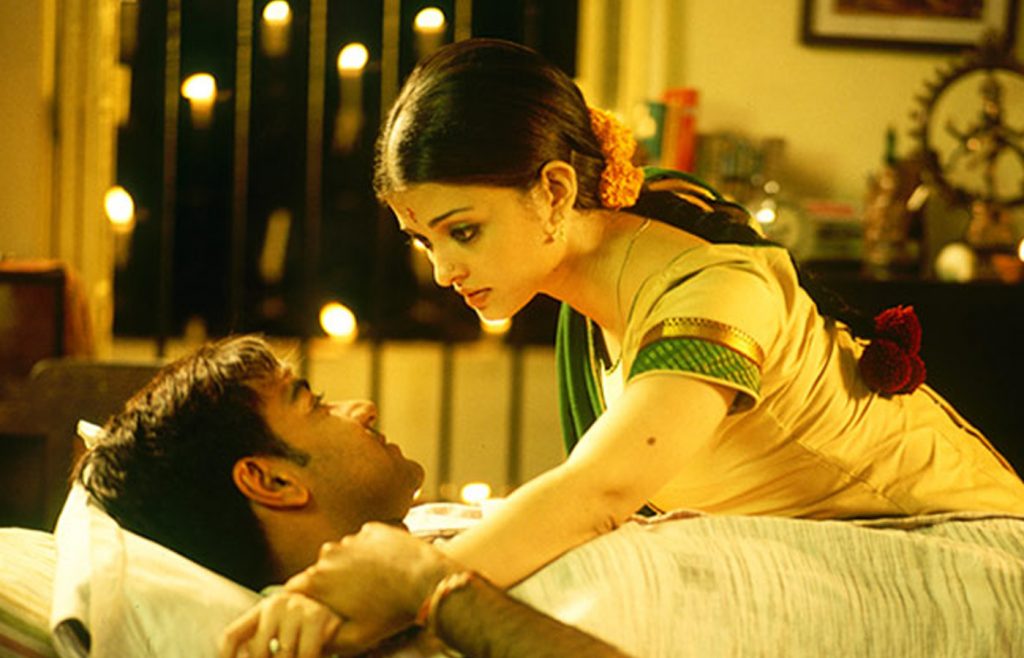To be honest, the first half of Raincoat has one gobsmacked. As one comes out at the intermission, you cannot help but feel that the film is not working at all. A killingly slow pace, obvious ‘acting’ by the leads particularly by Aishwarya Rai and terribly, terribly stilted dialogues really make you wonder if you are indeed watching a Rituparno Ghosh film. But as the plot begins to unravel in the second half, you actually begin to see much of the first half actually in perspective and as the film reaches its climax, you do feel the film has a few positives after all.
Tackling his first feature film in Hindi, Rituparno Ghosh, inspired by O Henry’s Gift of the Magi, by and large, makes good use of the limited space that much of the film takes place in. In his staging of scenes, you never feel too claustrophobic or caged in spite of the room being cluttered with furniture items and the windows of the house being closed to the outside world. And to Ghosh’s credit, you go along with the two leads. However, the interruptions from the outside world in fact tend to jar the narrative rather then give relief to the viewer but then again perhaps this exactly was the director’s intention after all. But you do feel at times he is hampered by being in one space as he resorts to fade ins and fade outs to show passage of time – surely this aspect could have been tackled more creatively.
Being primarily a two-character film, the film is quite a showcase for both Ajay Devgn and Aishwarya Rai. Naturally, the actors try and make the most of their roles. Though not his best performance, Devgan is efficiently good as ever, but a word here for Aishwarya Rai. After her stilted, fake act in Bride and Prejudice, she gives perhaps her most coherent performance since Hum Dil De Chuke Sanam (1999). While admittedly there are sequences where she is ‘acting’ (the line is extremely thin for both Devgn and Rai as they are acting out successful lives for each other but Devgn is always believable even in his lies while Rai seems to be ‘performing’), there are poignant moments of her character that she manages to capture with charm and dignity. Notice the heartrending tone of her voice as she asks Ajay to make a serial on her life or her breakdown when she asks him not to show her dreams. Anu Kapoor does bring some relief as the intruder in the house but perhaps the film might have explored doing away with him altogether and having Devgn realize the truth about Rai as he explores the house in her absence maybe finding the court notice or whatever. That could have made the film a lot stronger and more tightly knit, as Kapoor’s role is just there to offer us information and gets too explanatory.
On the negative side, the flashback sequences of Devgn and Rai are unable to bring out the intensity of their romance. In fact, there seems to be a surprising lack of chemistry between the two in these sequences. The transitions too into the flashback sequences could have been better handled. And as mentioned, much of the first half is killed by its total lack of pace and awful, meaningless squirm-worthy dialogues. Maybe the film might have worked better without an interval because at interval point, one is actually contemplating if one should watch the rest of the film.
Technically, Avik Mukherjee’s camerawork is a big plus point. Be it his evocative framing or subdued lighting, the two-time National Award winner enhances the film several notches. As does the Art Direction by Indranil Ghosh. Gulzar’s voice is used beautifully on the soundtrack and Debajyoti Misra comes up with a sensitive musical score.
Overall, in spite of its few genuine moments and fine enough performances, the film just about passes muster at best and one expected a far, far better film from Rituparno Ghosh considering his track record.
Hindi, Drama, Color
https://www.youtube.com/watch?v=AxLqC8dC1cI


